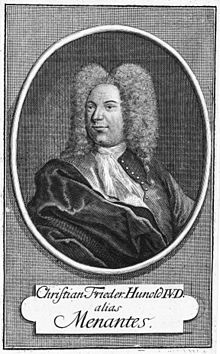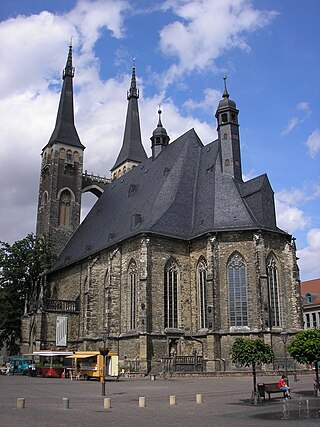
Christian Friedrich Hunold (born 29 September 1680 in Wandersleben near Gotha, died 16 August 1721 in Halle) was a German author who wrote under the pseudonym Menantes.

Christian Friedrich Hunold (born 29 September 1680 in Wandersleben near Gotha, died 16 August 1721 in Halle) was a German author who wrote under the pseudonym Menantes.
Hunold went to school in Arnstadt and continued in 1691 at the Gymnasium Illustre Augusteum in Weißenfels until 1698. From 1698 until winter 1699/1700 he studied law and languages at the University of Jena.
His first novel, Die Verliebte und Galante Welt (Hamburg: Liebernickel, 1700), was an instant success. The publication of his novel Satyrischer Roman (Satyrical Novel) in 1706 caused a scandal.
Hunold moved to Halle and held private seminars. The second part of Satyrischer Roman was published in Stade by Hinrich Brummer in 1710. Hunold continued his own studies and graduated in 1714 in law.
He died 6 August 1721 in Halle of tuberculosis.
A biography of him by Benjamin Wedel was published in 1731 including some of his letters.
Hunold wrote the libretto Der blutige und sterbende Jesus (The bleeding and dying Jesus), set by Reinhard Keiser in 1704, an early Protestant Passion oratorio.
Hunold appears to have known Bach, [1] and in Halle he wrote texts for Bach cantatas which were performed at the court of Leopold, Prince of Anhalt-Köthen. With the partial exception of Lobet den Herrn, alle seine Heerscharen, BWV Anh. 5, which uses religious themes, these were secular works, written especially for occasions such as birthdays. This collaboration between Bach and Hunold lasted from 1718 to 1720 after which year the composer found another librettist for his continuing series of congratulatory cantatas. After the poet had died Bach returned to his work as the basis for the cantata Ich bin in mir vergnügt. [1]

Christian Friedrich Henrici, writing under the pen name Picander, was a German poet and librettist for many of the cantatas which Johann Sebastian Bach composed in Leipzig.
Reinhard Keiser was a German opera composer based in Hamburg. He wrote over a hundred operas. Johann Adolf Scheibe considered him an equal to Johann Kuhnau, George Frideric Handel and Georg Philipp Telemann, but his work was largely forgotten for many decades.

Johann Rist was a German poet and dramatist best known for his hymns, which inspired musical settings and have remained in hymnals.

Angenehmes Wiederau, freue dich in deinen Auen, BWV 30.1, is a 1737 secular cantata by Johann Sebastian Bach, on a libretto by Christian Friedrich Henrici (Picander). Bach reused some of its music in later works, including Freue dich, erlöste Schar, BWV 30.2, one of his church cantatas, which was nearly entirely modelled after the secular composition.
Friedrich Nicolaus Bruhns or Brauns was a German composer and music director in Hamburg.

Johann Sebastian Bach composed the secular cantata Die Zeit, die Tag und Jahre macht, BWV 134.1, BWV 134a, while he was in the service of the court of Leopold, Prince of Anhalt-Köthen. Bach wrote the work as a serenata for the celebration of New Year's Day 1719.
Der Himmel dacht auf Anhalts Ruhm und Glück, BWV 66.1, BWV 66a, is a congratulatory cantata by Johann Sebastian Bach. The work was first performed in Köthen on 10 December 1718.

Ein Herz, das seinen Jesum lebend weiß , BWV 134, is a church cantata for Easter by Johann Sebastian Bach. Bach composed the cantata for the third day of Easter in Leipzig and first performed it on 11 April 1724. He based it on his congratulatory cantata Die Zeit, die Tag und Jahre macht, BWV 134a, first performed in Köthen on 1 January 1719.

Georg Christian Lehms was a German poet and novelist who sometimes used the pen-name Pallidor. He published poetry, novels, libretti for operas, and the texts of cantatas.
Ihr Häuser des Himmels, ihr scheinenden Lichter, BWV 193.1, is a secular cantata by Johann Sebastian Bach first performed on 3 August 1727. The music is lost, but it can be partially reconstructed as several movements are known to have shared music with Ihr Tore zu Zion, BWV 193.2, a church cantata which was premiered around three weeks after Ihr Häuser des Himmels, ihr scheinenden Lichter.
Ich bin in mir vergnügt, BWV 204, is a secular cantata composed by Johann Sebastian Bach in Leipzig between 1726 and 1727.

Lobet den Herrn, alle seine Heerscharen, BWV 1147, BWV Anh. 5, is a church cantata text by Christian Friedrich Hunold which was performed, most likely in a setting by Johann Sebastian Bach, for the twenty-fourth birthday of Prince Leopold of Anhalt-Köthen on 10 December 1718. The composition is lost, but its libretto survives in a 1719 print.
Christian Heinrich Postel was a German jurist, epic poet and opera librettist, who wrote 28 libretti for the Oper am Gänsemarkt in Hamburg: set by composers such as Johann Philipp Förtsch, Reinhard Keiser and Georg Philipp Telemann. His texts for a St John Passion were set by composers Christian Ritter, Johann Mattheson and Johann Sebastian Bach in their respective St John Passion.
Picander's cycle of 1728–29 is a cycle of church cantata librettos covering the liturgical year. It was published for the first time in 1728 as Cantaten auf die Sonn- und Fest-Tage durch das gantze Jahr. Johann Sebastian Bach set several of these librettos to music, but it is unknown whether he covered a substantial part of the cycle. This elusive cycle of cantata settings is indicated as the composer's fourth Leipzig cycle, or the Picander cycle.

On Trinity Sunday 27 May 1725 Johann Sebastian Bach had presented the last cantata of his second cantata cycle, the cycle which coincided with his second year in Leipzig. As director musices of the principal churches in Leipzig he presented a variety of cantatas over the next three years. New cantatas for occasions of the liturgical year composed in this period, except for a few in the chorale cantata format, are known as Bach's third cantata cycle. His next cycle of church cantatas, the Picander cycle, did not start before St. John's Day 24 June 1728.
Friedrich Wilhelm Birnstiel was an 18th-century German music publisher known for publishing two volumes of four-part chorales by Johann Sebastian Bach in the 1760s.
Miriam Feuersinger is an Austrian soprano.